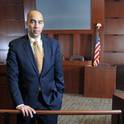
ABSTRACT: Improper use of new technology by jurors inside and outside the courtroom has become so pervasive that commentators have coined new phrases to describe it: “Google Mistrials,” the “Twitter Effect,” and “Internet-Tainted Jurors.” Yet, despite the attention garnered, few legal scholars, to date, have examined this area in-depth. The articles addressing this topic primarily focus on the benefits of technology and how to harness it to aid in juror comprehension. This dearth of legal scholarship may be due in large part to the fact that the Digital Age is fairly new and still evolving and juror misconduct is historically an under-examined area of the law. This article attempts to fill the current void by analyzing the detrimental impact of the Digital Age on sitting jurors and how it might be lessened. While many of the issues examined in this article apply equally to civil cases, the primary focus of this article is on jurors deciding criminal cases.
The article begins, in Part I, by discussing the influence of the Digital Age on juror: (1) research; (2) communications; and (3) privacy. In Part II, the article analyzes ways in which to limit the negative impact of new technology on these three areas. While no single solution or panacea exists for these problems, this article focuses on several reform measures that could address and possibly reduce the detrimental effects of the Digital Age on jurors. The three proposed remedies are as follows: (1) improving juror instructions; (2) allowing jurors to ask questions; and (3) disclosing juror information to the opposing party. In Part III, the article examines what might occur if the aforementioned remedies are not implemented or prove ineffective. Specifically, the article suggests that the courts may increase juror penalties and limit access to jurors.
As part of the research for this article, this author conducted the first-ever survey (“Jury Survey”) on jury service in the Digital Age. The Jury Survey Questions went to federal judges, prosecutors, and public defenders. The purpose of the Jury Survey was twofold: (1) to learn how the reform proposals suggested by this article are viewed by those who work with the legal system on a daily basis; and (2) to learn about other possible reform measures. Of particular note, the Jury Survey Respondents, like this author, believe that improved and updated jury instructions are the best approach to combat online research and improper communications by jurors. In contrast, a significant number of Jury Survey Respondents doubted whether allowing jurors to ask questions would decrease the likelihood of juror research and communications to third parties. This article, however, suggests the opposite and strongly encourages permitting questions by jurors.
- Litigation,
- Jury,
- Technology,
- Criminal,
- Internet
Available at: http://works.bepress.com/thaddeus_hoffmeister/7/
